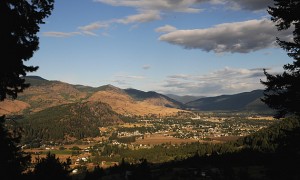Greetings and Salutations
My name is Stepan, and I am currently in my fifth year of studies at UBC. I am looking forward to finishing up this spring with majors in Creative Writing and English Lit. This blog is for a Canadian Literature course titled “Oh Canada: Our Home and Native Land?”In this course we will be exploring colonial narratives and Canadian indigenous realities through a literary lens.
I was born and raised in the small town of Grand Forks, BC, in the Southern Interior of the province. Indigenous history in this area was something which was generally not discussed during my upbringing, despite evidence of pre-colonial habitation. Rather, conventional history generally begins with white settlement and industrialization. In the beginning of the 20th century Grand Forks boasted the largest copper smelter in the British Empire, supplied by the now disappeared mining boom-town of Phoenix. Eurocentricism and the glorification of capitalist industry are concepts which, I believe, are at odds with a balanced understanding of Canadian history.
Many of my ancestors were Doukhobor, a pacifist religious sect exiled from the Russian Empire around the turn of the 20th century. In particular, my family belonged to a radical splinter group of the Doukhobors who called themselves The Sons of Freedom. The Sons Of Freedom garnered national and international attention for their unorthodox methods of nonviolent protest against the Canadian government, as well as for their acts of sabotage and destruction of property. At the root of this unrest was The Sons of Freedom refusal to assimilate to Canadian culture, and to send their children to English schools. The Sons of Freedom were the only non-indigenous ethnic group in BC to have their children forcibly put into residential schools. I am very proud of my ancestors’ independence.
I look forward to using this course as a way to explore alternative storytelling, and to challenge traditional or dominant concepts of Canadian identity. I believe it is important to recognize that colonialism is an ongoing process, and not something which resides strictly in our past. This course aims not only to analyze a variety of stories, but to discuss the reasons why some voices may be more prevalent than others. Ultimately this course will be a way for students to collaboratively engage issues of identity, voice, division, and history.
Works Cited:
Christina Lake Pictographs. N.d. Photograph. n.p. Web. 9 Jan 2014.
GeoBC, . British Columbia. BC Geographical Names.Phoenix BC. 2014. Web.
“Sons of Freedom 1944.” pasttensevancouver.tumblr. N.p., 12 01 2013. Web. 9 Jan. 2014.
The Spokesman Review, . “Bomb Blasts Rail Bridge in Kootenay.” news.google.com. N.p., 11 12 1961. Web. 9 Jan 2014.

Hi Stepan, well, you certainly come from an interesting background; the story of the The Sons of Freedom is one I am familiar with, as told by mainstream journalist: read: CBC in my youth – and I’d be most appreciative to hear more about your perspective on the world from your ancestral lens. That your ancestors had the similar experience of government forced confinement in residential schools is indeed an important connection. The story of the disappeared town of Phoenix is interesting, and I have to say I agree with you when you speak of “Eurocentricism and the glorification of capitalist industry are concepts which, I believe, are at odds with a balanced understanding of Canadian history.” I look forward to working with you and learning more about the place we call Canada from your perspective. Thanks